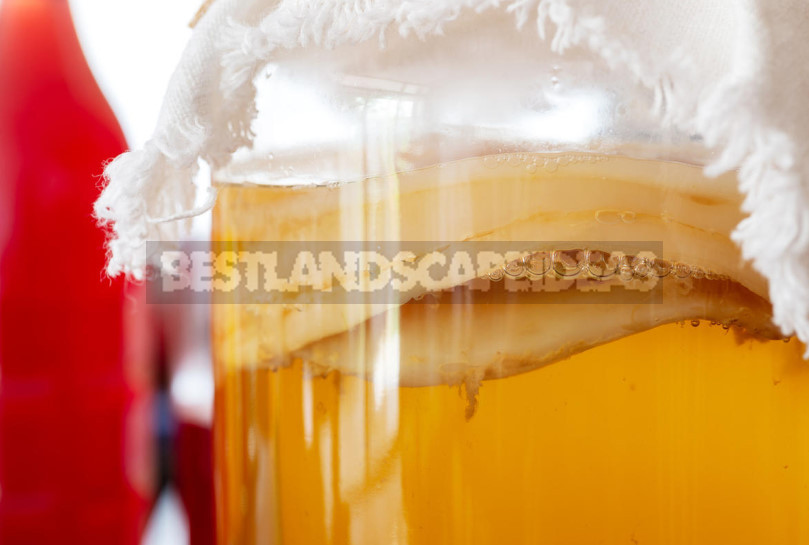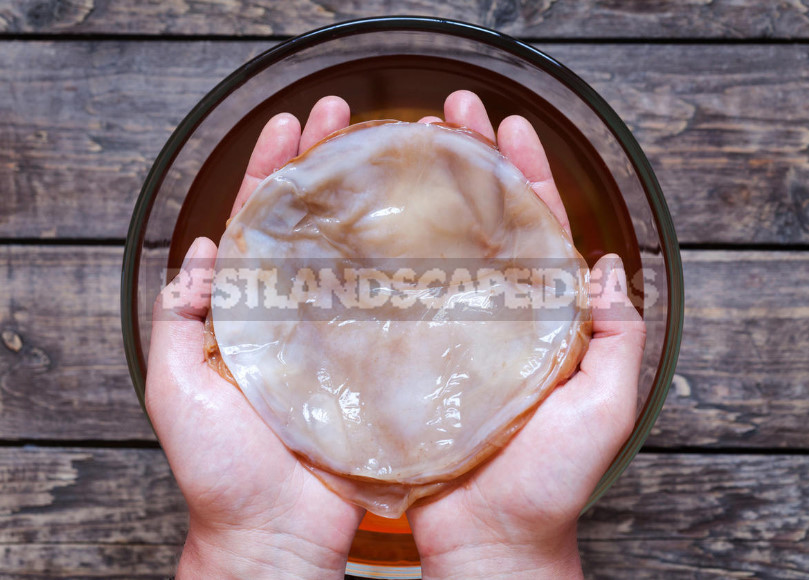Kombucha is a slightly sweet, slightly sour carbonated drink made from fermented tea. Many people find it tasty and useful, but some enthusiastic supporters argue that the Kombucha is a miraculous elixir that improves digestion, relieves arthritis, acts as a laxative, prevents microbial infections, diabetes, digestive diseases, helps in the fight against stress and cancer, increases the energy of the body.
A simple Google search for “health benefits of Kombucha” shows that there are even more extreme ideas about Kombucha: the allegedly fermented drink of sweetened tea brings spiritual purification to a person, that Kombucha is a natural mental protection from negative energies and bad thoughts. In this article, I tried to gather information about the Kombucha as a kind of phenomenon, about its supposed health benefits, as well as what science thinks about it.
Kombucha, zooglea…
Kombucha is formed by the fermentation of sweet tea, in which there is a symbiotic culture of acetic bacteria and yeast (zooglea). If the fermentation lasts long enough, a large amount of acid is formed, so sometimes the Kombucha is used to make vinegar.

Kombucha is sold worldwide in retail stores and online, usually with a short shelf life in the refrigerator. We know it more at home: many remember it in a three-liter jar in the kitchen of grandmothers and parents, covered with folded gauze. Many loved him as a child – a sweet and sour drink with bubbles, like lemonade.
For its preparation, both black and green sweet weak tea were used, and after a few days of fermentation, a slightly sparkling, slightly fruity-tasting drink was obtained, which “peroxide” after a long incubation.
In the zero years in our market there were a lot of varieties of lemonade and all kinds of drinks – and the fungus has almost disappeared from our homes. Cooking it is still a little troublesome: not everyone has enough patience to regularly drain, top up and wash the “tea jellyfish”.
Today in our stores Kombucha appears already in the “cultivated” form – produced by the food industry of the countries as a natural useful alternative to harmful carbonated drinks.
Ancient guest from China
Food historians believe that the Kombucha originated in northeastern China, in Manchuria. In 220 BC, during the Qing dynasty, this “divine cha” was highly valued as a tonic drink and a means of detoxification. As suggested, the name Kombucha he received when a physician named Kombu brought Kombucha from China to Japan.

Later, during the Russo-Japanese war, he came to Russia, and from there to Eastern Europe. In the 1950s, this drink became popular in Germany and France. And in 1960, Swiss scientists reported that the use of Kombucha is as useful as the use of yogurt, which helps to explain the popularity of Kombucha today.
A little chemistry and no miracles
Tea mushroom, getting into a favorable environment, is traditionally fermented for a week in a 3-4 liter transparent container. During fermentation, the fungus itself, which is a multilayer cellulose film, floats on the surface of sweetened tea.

Kombucha consists of microscopic yeast fungi and acetic bacteria embedded in the cellulose layer. The exact microbiological composition of the Kombucha varies depending on the source of the inoculate (a medium with live microorganisms useful for plants and animals), but it is guaranteed to contain different types of acetic proteobacteria. During fermentation, they produce thin layers of cellulose consisting of the cell mass of bacteria and yeast: a “daughter” cellulose film is formed on the tea surface, while the “mother” film is immersed below.

During the fermentation of sweet black tea microorganisms break down the tea ingredients and sucrose, thus formed acetic, lactic, gluconic and glucuronic acid, ethanol, glycerol and carbon dioxide. Fermentation of Kombucha also forms vitamins – scientists have found that the drink contains 1.6 times more vitamin B1 and 2-3 times more vitamin B12 than non-fermented sweetened black tea. The final composition and concentration of nutrients in the drink depends on the duration of fermentation, sugar concentration and age of the fungus.
Drink or not?
Scientific studies have shown that the drink contains probiotics and antioxidants, which provide its antimicrobial and detoxification properties. Like sauerkraut, kefir, yogurt and a number of other fermented foods, unpasteurized Kombucha can contain beneficial bacteria that can help digestion and support intestinal health.

Microorganisms from Kombucha produce antioxidants from tea polyphenols, which protects liver cells from oxidative damage. Due to acetic acid and high content of catechin, Kombucha is effective in suppressing both gram-positive and gram-negative pathogens. Kombucha also contains glucuronic acid, a substance that combines with toxins and carcinogens to form a glucuronide complex, which is then easily excreted from the body. In addition, glucuronic acid is essential for the body’s cartilage health, collagen formation and joint fluids.
However, not everything is so clear with the Kombucha mushroom: all available studies of the Kombucha mushroom were carried out on cellular and animal models. The lack of clinical trials for humans means that the benefits of Kombucha cannot be truly justified. Today, scientists can not clearly say that regular consumption of Kombucha has a real benefit for human health.

In addition, there are risks associated with consumption of Kombucha. Tea inoculate can cause stomach upset, acidosis, allergic reactions. Paradoxically, a probiotic-rich drink can pose a threat to pregnant women or those with a weakened immune system. On the one hand, pasteurization of the tea mushroom drink deprives it of its benefits, and on the other hand, it is impossible to keep a home-made tea mushroom sterile. Excessive acidification can lead to the appearance of undesirable harmful bacteria such as Clostridium botulinum.
Therefore, the production of the drink Kombucha should be carried out strictly according to the rules, with the mandatory maintenance of low pH to avoid the risk of harm to health. To make Kombucha at home you need to be very careful.
Not just for foods
The Internet is replete with various recommendations for the use of tea inoculate, including use as a drink, for facial care, making smoothies, desserts, animal feed, compost and all sorts of crafts. For example, Kombucha cellulose is the basis for the Filipino delicacy “Nata de Coco” (pieces of Kombucha cellulose in coconut syrup).

In addition, the cellulose of Kombucha is used as wound healing “mats”. Fans of the unusual environmentally friendly clothes make it from the dried pulp Kombucha grown in special large containers (it uses the ability of Kombucha to form a film across the entire surface of the dishes in which it is immersed).

These nice shoes are not made of leather. Material – Kombucha processed by special technology. The perfect solution for those who are against killing animals for clothing, and a fully biodegradable material (in contrast to the colour options).
But all these side uses of Kombucha do not cancel the main question: is Kombucha really a health drink or not? We may never know if there are no clinical trials for humans. After all, Kombucha is a live food, and it changes every time depending on many and many factors.
If you like its taste, and you have a healthy immune system, you can drink Kombucha with pleasure, but still make it at home with caution, observing sterility, not overexposing, washing and updating the fungus in time. And remember that probiotics and antioxidants can provide some benefit as part of a healthy diet, but don’t expect the Kombucha itself to prevent or cure any disease.
















